|
This section contains 345 words (approx. 2 pages at 300 words per page) |
Dictionary of Literary Biography on Charles Eliot Norton
CHARLES ELIOT NORTON (16 November 1827-21 October 1908), businessman, author, translator, and teacher, was a true Boston Brahmin; born in Cambridge, the son of Andrews Norton, Dexter Professor of Sacred Literature at Harvard College, and Catharine Eliot, he could trace his ancestry in this country back to 1634. After graduation from Harvard in 1846 at the age of nineteen, he became involved in the family import business and travelled extensively. Beginning in 1857, Norton turned to literary endeavors: first contributing to the Atlantic Monthly ,and later editing the North American Review (with James Russell Lowell) from 1864 to 1868, editing broadsides for the New England Loyal Publications Society during the Civil War, and aiding in the founding of the Nation in 1865. As a teacher at Harvard from 1873 to 1897 Norton attempted to raise the fine arts from neglect because he believed them to be an expression of the nation's moral aspirations. He died in Cambridge. Although he was concerned from the beginning of his literary career with developing the conditions for American creativity and the freedom of American tastes from European influence, Norton's major literary works were his translation of Dante's The Divine Comedy, 3 vols. (Boston: Houghton, Mifflin, 1891-1892) and an edition of The Poems of John Donne, 2 vols. (New York: The Grolier Club, 1895). His Historical Studies of Church-Building in the Middle Ages (New York: Harpers, 1880) is important because Norton viewed the Gothic Cathedrals of Europe as products of artistic and religious fervor, thus giving credence to the morally-based theory of art he propounded for America. But despite his contributions to scholarship in the fine arts, Norton's greatest talent was making friends. Many of his friendships, like those with Carlyle and Lowell, bore fruit in the form of publications, particularly The Correspondence of Thomas Carlyle and Ralph Waldo Emerson, 1834-1872, 2 vols. (Boston: James R. Osgood, 1883), and Last Poems of James Russell Lowell (Boston: Houghton, Mifflin, 1895). A thoroughgoing Emersonian as a young man, Norton later tempered his optimism with a respect for the past and attempted to teach the values of tradition to the rootless and materialistic society of post-Civil War America.
|
This section contains 345 words (approx. 2 pages at 300 words per page) |


